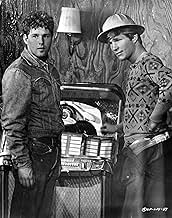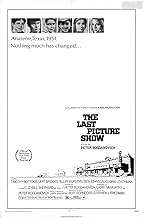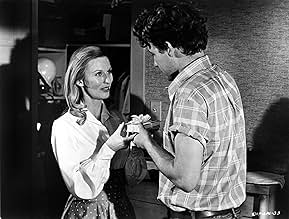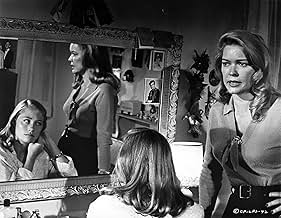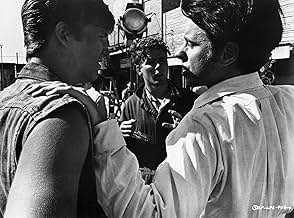Em 1951, um grupo de estudantes do ensino médio chegou à idade adulta em uma cidade desolada, isolada e atrofiada no norte do Texas que está morrendo lentamente, tanto cultural como economic... Ler tudoEm 1951, um grupo de estudantes do ensino médio chegou à idade adulta em uma cidade desolada, isolada e atrofiada no norte do Texas que está morrendo lentamente, tanto cultural como economicamente.Em 1951, um grupo de estudantes do ensino médio chegou à idade adulta em uma cidade desolada, isolada e atrofiada no norte do Texas que está morrendo lentamente, tanto cultural como economicamente.
- Ganhou 2 Oscars
- 19 vitórias e 22 indicações no total
- Charlene Duggs
- (as Sharon Taggart)
Enredo
Você sabia?
- CuriosidadesCybill Shepherd was cast with the option of backing out of her nude scenes if she so desired. She only agreed to do them after asking the opinions of three female costars - Cloris Leachman, Ellen Burstyn, and Eileen Brennan, who all thought she should do them.
- Erros de gravaçãoThe lavalier mic on Duane's tie is visible during the graduation scene.
- Citações
Sam the Lion: You boys can get on out of here, I don't want to have no more to do with you. Scarin' a poor, unfortunate creature like Billy just so's you could have a few laughs - I've been around that trashy behavior all my life, I'm gettin' tired of puttin' up with it. Now you can stay out of this pool hall, out of my cafe, and my picture show too - I don't want no more of your business.
- Versões alternativasSpecial edition includes seven minutes of footage not included in the original release.
- ConexõesFeatured in The Last Picture Show Re-Release Promo (1971)
- Trilhas sonorasCold, Cold Heart
(uncredited)
Written by Hank Williams (as Hank Williams Sr.)
Performed by Tony Bennett
In the hands of lesser talents, the subject matter of unimportant people doing unimportant things might have yielded a tiresome soap opera. But the film's script is poetic, the direction is skillful, the B&W cinematography is artistic, the casting is perfect, and the performances are superlative.
The story draws heavily from early American individualism. Life here is mostly physical, not mental. Human relationships are direct, immediate, one-on-one. Except for schools, which are given some prominence, cultural institutions exist in the film only vaguely or not at all. For entertainment, people listen to radio, which features the mournful country-western music of Hank Williams. Or, they go to the town's decrepit picture show, where an elderly Miss Mosey kindly returns money to the kids who got there too late to see the cartoons.
If the film has a weakness it is in the presentation of a realism that is incomplete. We see mostly stifling bleakness, though that is ameliorated somewhat by humor. What we don't see are the uplifting influences and the optimism that sustained agrarian generations through hardships and rough times.
Nevertheless, within the film's story parameters, the film does convey an accurate account of what life was like for ordinary folks in West Texas in the early 1950s. I doubt that this film could be made today. Contemporary audiences have been conditioned to expect non-stop action, loudness, glitz, and overblown special effects, all of which are absent, mercifully, from this film.
Low-key, perceptive, bleak, and melancholy, "The Last Picture Show" easily makes my list of Top Ten favorite films of all time.
- Lechuguilla
- 28 de jan. de 2006
- Link permanente
Principais escolhas
Detalhes
- Data de lançamento
- País de origem
- Idioma
- Também conhecido como
- La Última Película
- Locações de filme
- 605 South Ash Street, Archer City, Texas, EUA(high school)
- Empresas de produção
- Consulte mais créditos da empresa na IMDbPro
Bilheteria
- Orçamento
- US$ 1.300.000 (estimativa)
- Faturamento bruto nos EUA e Canadá
- US$ 29.133.000
- Faturamento bruto mundial
- US$ 29.146.255
- Tempo de duração1 hora 58 minutos
- Cor
- Mixagem de som
- Proporção
- 1.85 : 1
Contribua para esta página






